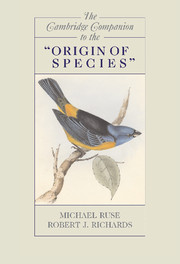Book contents
- Frontmatter
- Foreword
- Introduction
- 1 The Origin of the Origin
- 2 Darwin’s Analogy between Artificial and Natural Selection in the Origin of Species
- 3 Variation and Inheritance
- 4 Darwin’s Theory of Natural Selection and Its Moral Purpose
- 5 Originating Species: Darwin on the Species Problem
- 6 Darwin’s Keystone: The Principle of Divergence
- 7 Darwin’s Difficulties
- 8 Darwin’s Geology and Perspective on the Fossil Record
- 9 Geographical Distribution in the Origin of Species
- 10 Classification in Darwin’s Origin
- 11 Embryology and Morphology
- 12 Darwin’s Botany in the Origin of Species
- 13 The Rhetoric of the Origin of Species
- 14 “Laws impressed on matter by the Creator”? The Origin and the Question of Religion
- 15 Lineal Descendants: The Origin’s Literary Progeny
- 16 The Origin and Political Thought: From Liberalism to Marxism
- 17 The Origin and Philosophy
- 18 The Origin of Species as a Book
- Bibliography
- Index
17 - The Origin and Philosophy
Published online by Cambridge University Press: 28 January 2009
- Frontmatter
- Foreword
- Introduction
- 1 The Origin of the Origin
- 2 Darwin’s Analogy between Artificial and Natural Selection in the Origin of Species
- 3 Variation and Inheritance
- 4 Darwin’s Theory of Natural Selection and Its Moral Purpose
- 5 Originating Species: Darwin on the Species Problem
- 6 Darwin’s Keystone: The Principle of Divergence
- 7 Darwin’s Difficulties
- 8 Darwin’s Geology and Perspective on the Fossil Record
- 9 Geographical Distribution in the Origin of Species
- 10 Classification in Darwin’s Origin
- 11 Embryology and Morphology
- 12 Darwin’s Botany in the Origin of Species
- 13 The Rhetoric of the Origin of Species
- 14 “Laws impressed on matter by the Creator”? The Origin and the Question of Religion
- 15 Lineal Descendants: The Origin’s Literary Progeny
- 16 The Origin and Political Thought: From Liberalism to Marxism
- 17 The Origin and Philosophy
- 18 The Origin of Species as a Book
- Bibliography
- Index
Summary
DARWIN AND DARWINISM
Darwinism is all the rage in philosophy these days. Evolutionary thinking of one kind or another is frequently used to illuminate such areas as ethics (e.g., Joyce 2006), epistemology (e.g., Hull 1988), and the philosophy of mind (e.g., Sterelny 2003). But it is one thing to examine how evolutionary work in a broadly Darwinian style has influenced philosophy, another to ask what form of philosophical insight is present in Darwin’s own oeuvre. And it is something else yet again to ask what the specific relationship might be between philosophy and the Origin of Species. This last question can be broken down into an analysis of the work’s philosophical legacy and an analysis of its philosophical content.
Since the Origin has so often been taken by later thinkers as the canonical statement of a Darwinian worldview, any project of assessing that book’s philosophical legacy risks sliding toward a hopelessly ambitious attempt to embrace all those subsequent forms of philosophical Darwinism that the Origin has inspired. This essay consequently focuses on the Origin’s own philosophical content. In the next section I will catalogue some of the philosophical themes that arise in it.
- Type
- Chapter
- Information
- The Cambridge Companion to the 'Origin of Species' , pp. 314 - 332Publisher: Cambridge University PressPrint publication year: 2008
- 1
- Cited by



